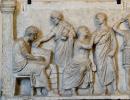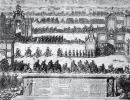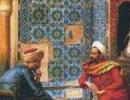Presentation on the topic of young voters. Presentation "Voter School" presentation for a social studies lesson (9th grade) on the topic. Why do we choose
Law game for high school students with presentation
The extracurricular event “You are a future voter” can be held in the form of a game “Hundred to One” among schoolchildren or students. In preparation for the game, it is necessary to form two or three teams, which will have to show their erudition in knowledge of the basics of the Constitution of the Russian Federation, voter rights, as well as local authorities (the event was developed based on material from the Ivanovo region).“The main danger to democracy is the people’s indifference to politics.” E. Sevrus
Purpose of the event: activating the civic position of students, forming an idea of the need to participate in the political life of the country.
Tasks:
- formation of the foundations of legal culture;
- expanding knowledge about the electoral system and the rights and freedoms of a citizen of the Russian Federation;
- education of citizenship and patriotism;
- development of students’ communication skills;
- formation of skills
- express your thoughts clearly and clearly;
- work with sources, literature and Internet resources.
Equipment: computer or laptop, projector, presentation.
Preliminary preparation.
Participants of the event need to form teams and study literature on the topics: “Rights of a citizen of the Russian Federation”, “Constitution of the Russian Federation”, “Electoral law”, “Authorities of the Ivanovo region”.
Progress of the event.
In life, a person always has to choose: friends, profession, life partner, actions, etc. It is very difficult to choose one’s destiny, but it is even more difficult to choose when it comes to the fate of an entire state. In a democratic state, such as modern Russia, power belongs to the people, and this means that the future of the country depends on you and me. In the conditions of freedom that modern society provides to a person, each citizen makes independent decisions and chooses his own path. It is very difficult to make the right choice without knowledge. And today we will check what knowledge you, future voters, have in the field of civil rights and participation in elections.
So, the rules of the game. Here are five categories, each containing five questions of varying difficulty. The cost of the question corresponds to its complexity. The team that gives the correct answer to the question gets the opportunity to choose the category and cost of the question. In case of an incorrect answer, the opposing team has the opportunity to give their version. If, when choosing a question, a team gets a “Pig in a Poke”, it must give the question to the opposing team, who have the right to increase the cost of the question as they wish. The winner of the game will be the team that scores the most points based on the results of the game.
The correctness of the answers will be assessed by a strict but fair jury consisting of...

So, we begin the game “One Hundred to One”. So the team that answers my question faster will get the right to start the game. Attention, question:
“The fundamental law of the state is this?”






Questions for the game:
Block 1. Citizen's rights.
10. At what age does a citizen of the Russian Federation have fundamental rights and freedoms? (Article 60 of the Constitution of the Russian Federation. A citizen of the Russian Federation can independently exercise their rights and obligations in full from the age of 18.)
20. At what age can a citizen of the Russian Federation run for the position of deputy of the State Duma of the Russian Federation? (Article 97 of the Constitution of the Russian Federation. A citizen of the Russian Federation who has reached the age of 21 and has the right to participate in elections can be elected as a deputy of the State Duma).
30. Active suffrage presupposes participation in elections as...? (Active suffrage is the right of citizens to participate in elections of the head of state and representative bodies of government (parliament, municipality, etc.) as a voter.)
40. Cat in a poke. What is the term of office of the precinct election commission? (Precinct election commissions are formed for a period of 5 years (usually about a month before voting day), their powers expire no earlier than 10 days from the date of official publication of the results of the elections, referendum).
50. Who is the guarantor of human rights and freedoms in the Russian Federation? (Article 80 of the Constitution of the Russian Federation. The President of the Russian Federation is the guarantor of the Constitution of the Russian Federation, the rights and freedoms of man and citizen.)
Block 2. Constitution of the Russian Federation.
10. When and how was the current Constitution of the Russian Federation adopted? (The Constitution of the Russian Federation was adopted on December 12, 1993 by referendum.)
20. According to the Constitution of the Russian Federation, the highest value in our country is (are) ... ? (Article 2 of the Constitution of the Russian Federation. “Man, his rights and freedoms are the highest value. Recognition, observance and protection of the rights and freedoms of man and citizen is the duty of the state.”)
30. Cat in a poke. When were the last presidential elections in the Russian Federation held? (On March 4, 2012, elections for the President of the Russian Federation took place.)
40. The Constitution of the Russian Federation contains the concepts of “human rights” and “civilian rights”. Is there a difference between them? If so, which one? (Yes, there is a difference. Human rights are basic, they are inherent in all people from birth, and the rights of a citizen are assigned to a person only by virtue of his belonging to the state (citizenship). These rights usually presuppose the possibility of participation in state affairs, in elections of higher and local public authorities, admission to public service in their country.)
50. According to Art. 135 of the Constitution of the Russian Federation, the provisions of Chapters 1, 2 and 9 cannot be revised by the Federal Assembly. Is it possible to change their content? If so, how? (Changing the content is possible. To amend chapters 1, 2 and 9 of the Constitution of the Russian Federation, it is necessary to convene a Constitutional Assembly.)
Block 3. You are a voter.
10. At what age can a citizen of the Russian Federation run for the position of President? (Article 81 of the Constitution of the Russian Federation. A citizen of the Russian Federation who is at least 35 years old can become the President of the Russian Federation...)
20. Can a voter vote outside the polling station? What does that require? (Yes, if he cannot arrive at the polling station for valid reasons. Voting is carried out on election day and only on the basis of a written or oral request from the voter.)
30. Which body ensures the implementation and protection of citizens' electoral rights? (The protection and implementation of citizens' electoral rights is a priority for election commissions.)
40. In what cases can a voter be removed from the voter lists? (The exclusion of a citizen of the Russian Federation from the voter list is carried out only on the basis of official documents on the inclusion of the voter in the list at another polling station, as well as in the case of issuing an absentee certificate to the voter.)
50. Cat in a poke. How many members does the Central Election Commission of the Russian Federation consist of? (The Central Election Commission of the Russian Federation consists of 15 people.)
Block 4. Authorities of the Russian Federation
10. How many deputies does the State Duma of the Russian Federation consist of? (The State Duma consists of 450 deputies.)
20. For what term and under what electoral system is the President of the Russian Federation elected? (The President of the Russian Federation is elected for six years using a majoritarian electoral system of absolute majority.)
30. Who acts as the President of the Russian Federation in the event of early termination of his powers? (Article 92 of the Constitution of the Russian Federation. In all cases when the President of the Russian Federation is unable to fulfill his duties, they are temporarily performed by the Chairman of the Government of the Russian Federation.)
40. In what cases can the President of the Russian Federation dissolve the State Duma? (The President has the right to dissolve the State Duma in two cases: 1) after the candidates for Chairman of the Government submitted by the President have been rejected three times; 2) if the State Duma refuses to trust the Government.)
50. The Federal Constitutional Law states: “In the Russian Federation there are federal courts, constitutional courts and magistrates of the constituent entities of the Russian Federation.” And what kind of ships cannot exist in Russia? (Article 118 of the Constitution of the Russian Federation. The creation of emergency courts is not allowed in the Russian Federation.)
Block 5. Ivanovo region
10. Who currently heads the Government of the Ivanovo region? (The government of the Ivanovo region is headed by Governor Pavel Alekseevich Konkov.)
20. Cat in a poke. What electoral system is used in the Russian Federation for elections of deputies to the State Duma? (Elections of deputies to the State Duma of the Russian Federation are carried out according to the proportional electoral system.)
30. Name the legislative body of the Ivanovo region. (The legislative body of the Ivanovo region is the Ivanovo Regional Duma.)
40. How many deputies are there in the Ivanovo Regional Duma? (There are 26 deputies in the Ivanovo Regional Duma.)
50. What political groups (factions) are represented in the Ivanovo Regional Duma of the last convocation? (The Ivanovo Regional Duma is represented by 1) United Russia, 2) the Communist Party of the Russian Federation, 3) the Liberal Democratic Party.)
The floor to sum up the results of the game is given to the jury members.
Reflection: If you liked participating in the game, draw a smiling emoticon on the board, and if not, draw a sad one.
At the end of the game, team members are awarded incentive prizes.
To use presentation previews, create a Google account and log in to it: https://accounts.google.com
Slide captions:
COAT OF ARMS OF RUSSIA
FROM THE HISTORY OF ELECTIONS IN RUSSIA in the period from the XII to the XV centuries. Novgorod feudal republic; in the XVI - XVII centuries. Moscow state. Zemsky Sobors, early 20th century. -The State Duma; February Revolution of 1917 - All-Russian Constituent Assembly; USSR - Supreme Soviet of the USSR;
FROM THE HISTORY OF ELECTIONS IN RUSSIA Currently, state power in the Russian Federation is exercised by: - the President of the Russian Federation; - Parliament of the Russian Federation - Federal Assembly (Federation Council and State Duma); - Government of the Russian Federation; - courts of the Russian Federation.
State power in the constituent entities of the Russian Federation is exercised by the state authorities formed by them.
The highest direct expression of the power of the people is a referendum and free elections (Article 3 of the Constitution of the Russian Federation)
CENTRAL ELECTION COMMISSION OF THE RUSSIAN FEDERATION DECISION of December 28, 2007 N 83/666-5 ON YOUNG VOTER DAY Hold Young Voter Day in the constituent entities of the Russian Federation every third Sunday of February.
ELECTORAL SYSTEMS IN THE RUSSIAN FEDERATION Majoritarian electoral system Proportional electoral system Mixed electoral system
Proportional electoral system (based on party lists) The body elected under this system is staffed on the basis of party representation. Elections of deputies to the State Duma of the Federal Assembly of the Russian Federation are held using a proportional system.
Majoritarian electoral system The candidate who receives the largest number of votes in his favor is recognized as elected. Majoritarian system of absolute majority - (more than half of the votes) under this system the elections of the President of the Russian Federation are held. Majority system of relative majority - this system is used to conduct elections of deputies of the Omsk City Council, deputies of Councils of municipal districts, urban and rural settlements, the Mayor of Omsk, heads of municipal districts, urban and rural settlements.
Mixed electoral system Provides for a majoritarian and proportional system for obtaining and distributing deputy mandates. Elections of deputies to the Legislative Assembly of the Omsk Region are being held using a mixed system.
FEDERAL LAW ON BASIC GUARANTEES OF ELECTION RIGHTS AND THE RIGHT TO PARTICIPATE IN A REFERENDUM OF CITIZENS OF THE RF Adopted by the State Duma on May 22, 2002 A citizen of the Russian Federation who has reached the age of 18 years has the right to vote, to be elected...
YOU HAVE THE RIGHT TO CHOICE! When you vote, you are exercising your civil right to choose a worthy candidate who will represent You and Your interests. The voice of every citizen becomes decisive in determining the fate of our country!
A young voter needs to know: Active suffrage is the right of citizens of the Russian Federation to vote. Passive suffrage is the right of citizens of the Russian Federation to be elected. A voter is a citizen of the Russian Federation who has active voting rights.
ARE YOU 18 YEARS OLD ALREADY? Then you can become a candidate for deputy: - Omsk City Council; - Council of a municipal district, urban and rural settlement of the Omsk region. ARE YOU 21 YEARS OLD ALREADY? Then you can become a candidate: - for deputies of the State Duma of the Federal Assembly of the Russian Federation; - to the deputies of the Legislative Assembly of the Omsk region; - for the position of head of a municipal district, head of urban and rural settlements of the Omsk region.
CHARTER OF THE MUROMTSEV MUNICIPAL FORMATION The District Council of the Muromtsevo formation consists of 15 deputies elected for a period of 5 years on the basis of universal, equal, direct suffrage by secret ballot. (Article 6) The head of the administration of the Muromtsevo municipal formation is an elected official and is elected in municipal elections for a period of five years. (Article 39)
YOUTH AND ELECTIONS Currently, more than 5 thousand young deputies under the age of 35 have been elected to bodies from the village council to the State Duma of the Russian Federation. In the Federation Council of the Federal Assembly of the Russian Federation, out of 166 senators, 7 senators are aged from 31 to 35 years. Of the 450 deputies of the State Duma of the Federal Assembly of the Russian Federation, 50 deputies are young people aged 23 to 34 years: “UNITED RUSSIA” - 33 deputies; “L DPR” - 8 deputies; “A JUST RUSSIA” - 5 deputies; "Communist Party of the Russian Federation" - 4 deputies.
In the Omsk region, 99 young deputies were elected: - 89 people to village councils; - councils of urban and rural settlements – 6 people; - to the Omsk City Council - 1 person; - to the Legislative Assembly of the Omsk Region - 3 people.
YOUTH CHOOSE THE FUTURE
Reflection test “I AM A YOUNG VOTER”
1. If you are invited to an event to improve the legal culture of young and future voters, then: a) I will not participate; b) I don’t know; c) I will take part.
2. If your best friend persuades you to vote in the elections for a candidate he likes, then: a) I will do what he asks; b) I don’t know what to do; c) I won’t.
3. If you are offered decent money for your ballot, then: a) Sell; b) I don’t know what to do; c) I won’t sell.
4. If on election day I have a chance to have a great rest with an overnight stay by the river in great company, then: a) I will not vote; b) I don’t know what to do; c) I will vote.
5. If you find out that on election day your parents are going to their dacha (out of town, on a visit) and do not intend to vote, then: a) I will remain silent; b) I don’t know what to do; c) I will ask you to vote
6. If one of the candidates promises young people, if he wins, annual free trips abroad every Saturday throughout his term, then: a) I will vote for him; b) I don’t know what to do; c) I will vote for another candidate.
7. If one of the candidates promises before the elections to sharply reduce the prices of food and clothing, the cost of housing and communal services, then: a) I will vote for him; b) I don’t know what to do; c) I will vote for another candidate.
8. If one of the candidates promises to cleanse the country of “foreigners who are causing all the trouble,” then: a) I will vote for him; b) I don’t know what to do; c) I will vote for another candidate.
9. If one of the candidates is guaranteed to promise to eradicate corruption, crime, drug addiction, alcoholism in the shortest possible time, then: a) I will vote for him; b) I don’t know what to do; c) I will vote for another candidate.
You were given the right to decide how we should live - so decide! Don't hesitate! Don't hesitate! Don't blame everything on someone else! There is a choice today, which means go ahead - choose! Perhaps yours will be the most powerful word!
You choose the future!
1. Who in the Russian Federation has active voting rights?
2. Name the principlesdemocratic elections 3. What electoral systems
are used in elections in the Russian Federation? 4. Name the existing qualifications
(age and residence)
provided for
legislation in the implementation
passive suffrage? 5. What is the percentage of votes called?
giving grounds for receiving
parliamentary mandates? 6. What is a person’s reluctance called?
participate in elections? 7. What kind of ballot papers
Are they considered damaged? 8. What is the name of the ceremony
entry of the President of the Russian Federation into
job title? 9. To be elected as a deputy in
The State Duma needs
reach the age...? 10. What day is called “day
silence"? 11. Person nominated in the prescribed manner
law order as
candidate for replacement
through direct elections
job title 12. Voting of citizens on the most
important issues of public
values 13........ - highest legislative
representative body of government
or another state 14. How long is he elected for?
State Duma of the Russian
Federation, President of the Russian
Federation? 15. Name the number of deputies
State Duma 16. When does the election campaign begin?
propaganda in the media? 17. By what principle are they placed?
political parties in the electoral
newsletter 18. Name the main source
voting rights 19.When in our country there were
first elections held
to the State Duma? 20. When was it introduced in our country
Institute of Presidency? 21. What is the name of the territorial
unit from which members are elected
elected representative bodies 22. Is the statement true?
“During elections to the State
Duma and the President of the Russian Federation federal
the district includes the entire territory
Russia." 23. Is the statement true?
"Members of the election commission
can participate in the election
campaigning at one's own request" 24. List those officials
persons who are elected in the Russian Federation
(1 minute for discussion) 25. What was the list of candidates for
Presidents of Russia in elections
2018? Answer
Answer
Answer
Answer
1. Citizens of the Russian Federation over 18 years of age who have legal capacity and are not in prison.
2. Universal, equal, direct by secret ballot
3. Majoritarian, proportional and mixed.
4. 18 years when elected as a deputy of a local government body, 21 when elected as a deputy of the Legislative Assembly and the State Duma, 35
for a presidential candidate and 10 years of residence in the Russian Federation
Answer 5. Electoral threshold
Answer 6. Absenteeism
Answer 7. Ballots that do not contain marks in the squares located
to the right of information about registered candidates, from the position “For” or “Against”, or in which the sign(s) is affixed
(marked) in more than one square. ...
Answer 8. Inauguration
Answer 9. 21 years old
Answer 10. Last before voting
Answer 11. Candidate.
Answer 12. Referendum
Answer 13. Parliament
Answer 14. State Duma for 5 years; President of the Russian Federation for 6 years
Answer 15. 450 deputies
Answer 16. 28 days before the elections
Answer 17. The order is determined by drawing lots.
Answer 18. Constitution of the Russian Federation
Answer 19. For the first time, voting rights to Russian citizens were granted in 1906 during the first Russian revolution. IN
In pre-revolutionary Russia, more than half of the citizens did not have voting rights - women, military personnel, youth under 25, residents
national outskirts. For many years universal suffrage was the main goal of political struggle
Answer 20. In 1990
Answer 21. District
Answer 22. Yes
Answer 23. No. In accordance with the Federal Law “On Basic Guarantees...” (Clause 5, Article 37), they cannot
voting members of election commissions, state bodies, local government bodies,
charitable organizations, religious associations, as well as persons holding state and municipal positions,
state and municipal employees, military personnel in the performance of their official duties or with
using the advantages of official or official position.
Answer 24. The President of the Russian Federation, deputies of the State Duma, deputies of representative and legislative authorities of the constituent entities of the Russian Federation
and deputies of local governments
Answer 25. Electronic voting ballot Elections of the President of the Russian Federation
The quiz was prepared by N.V. Kharlamova.
To use presentation previews, create a Google account and log in to it: https://accounts.google.com
Slide captions:
Business game “Voter School”. Developed by Nekrasova G.A. Municipal educational institution "Popovskaya secondary school".
DEMOCRACY - democracy by the people. This form of political regime originated in Ancient Greece.
Democracy (democracy) Direct (citizens directly influence state affairs) Representative (citizens influence state policy through their representatives.
Representative democracy Elections Referendum
FILL IN THE BLANKS IN THE TEXT. All citizens of the Russian Federation who have reached ___ years of age and have _________ have the right to vote. There are two types of suffrage - ________ (all capable citizens over 18 years of age have it) and ________ (the right to be elected to government bodies). A capable citizen who has reached ___ years of age can be elected to the self-government bodies, and a person at least ___ years old, capable, who is a citizen of the Russian Federation and has lived on its territory for at least ___ years, can be elected to the position of president.
CORRECT ANSWERS: All citizens of the Russian Federation who have reached the age of 18 and have legal capacity have the right to vote. There are two types of suffrage - active (all capable citizens over 18 years of age have it) and passive (the right to be elected to government bodies). A capable citizen who has reached the age of 21 can be elected to self-government bodies, and a person at least 35 years old, capable, a citizen of the Russian Federation and residing on its territory for at least 10 years can be elected to the position of president.






